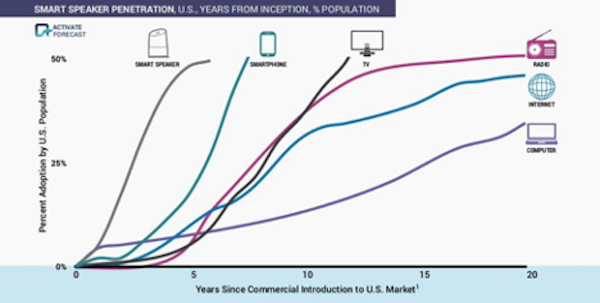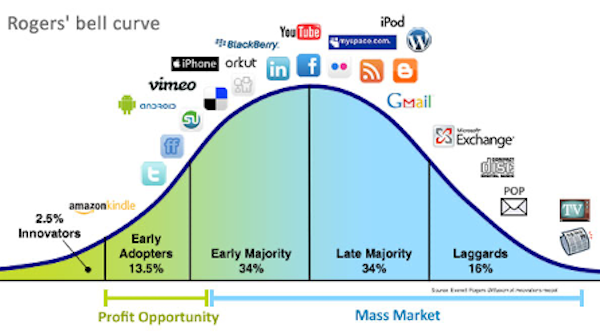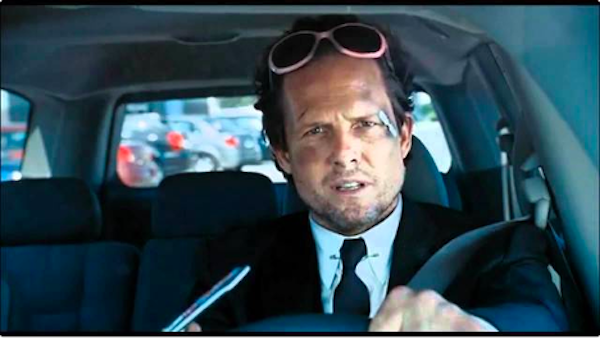The 1960s saw the emergence of mainframes, the 70s the mini-computer, the 80s the personal computer, the 90s the Web, and the 2000s Smartphones and Social Media. At every iteration, the core innovation moved us towards greater usability of computing by a greater number of people. Today, we are witnessing the next evolution of usability and access: the rise of Voice First — the most natural human-to-artificial-intelligence interface, the one that no engineer or designer invented: the interface of human natural language. And at every iteration, the rate of adoption of the new enabling technology increased compared to the previous innovation. It took decades for the PC to go mainstream, a decade for the smartphone to be the hand of more than 50% of the population, and half of that for Voice First to reach the same milestones.

Indeed, what we are witnessing is nothing short of the emergence of a whole new world — The Voice First Web — and just as we did in the late 1990s, when the Web as we know it was emerging, everyone is beginning to understand that this new web is not a passing fad. But just as with the Web, this new disruption is so fundamental and so far reaching that it is difficult for us to meaningfully imagine the full implications that the disruption will have on the way we live our daily lives, do business, and interact with one another.
But one lesson that we, those who witnessed the birth of the PC, the Web, the Smartphone, Social Media, can all agree on, is this: those who started early, those who took the trend seriously, those jumped in and adopted early, benefited enormously from engaging and acting and doing, and those who didn’t, had to play catch up at great expense.

Take Marketing as an example. Unfathomable as it may be to us today, it took several years after the launch of the Mosaic browser in 1993 before having a website became a marketing table stake. The same thing happened with Facebook, Twitter, Youtube, the Smartphone, Instagram: it took several years before what is now an obvious must-have was taken seriously by marketers and pulled into their marketing properties portfolio.
As the adoption of Voice First goes mainstream, we are witnessing the same story unfold. A few forward thinking branding and digital marketing executives (e.g., TD Ameritrade, The Motley Fool, Millennium Trust Company) seem to have learned the lesson and are jumping in early (TD Ameritrade and The Motley Fool launched their Alexa skills and Google actions in 2016!), but, as with previous disruptions, the vast mainstream has yet to catch on. And one can hardly blame them: they have a full raft of channels to manage — Facebook, Twitter, Linkedin, Instagram, Youtube, to mention the table stakes — and so yet another channel is not what they are looking for. But one can easily imagine a near future where a short daily audio update, spoken in the actual voice of brand representatives (Progressive’s Flo, Allstate Insurance’s Mayhem or Dennis Dexter Haysbert, The Sonic Guys) would be part of the marketing and branding mix. Commercials could point people to their voice channel for more details (contests, quizzes, tips, or just humor for its own sake), enabling them to deepen the brand bonding and extend the conversation far more intimately than via Twitter or Facebook, or even Instagram.

And the same is happening with Customer Care. Just as it took Customer Care leaders years to adopt basic technologies, such as the plain old telephone, email, the web, self-service telephony, and chat, the same is happening with the Voice First channel. Again, it is not a feat of imagination to look forward to a near future where every product that you buy has a call to action from the product’s packaging that enables you to ask questions through Alexa, Google Assistant, Samsung Bixby, or whatever platform the company has deployed its assistant on. And just as people are becoming more and more accustomed to asking their voice assistant for the weather, news, the time, and general questions, it is not a great leap to imagine customers turning to their Voice First assistant when a question about a product they are using comes up.
So, what is your business doing to jump in early and reap the benefit of an early adopter? As an insightful study by Congizant revealed, early adopters avoid paying the hefty price of a “Laggard Penalty” (the later your adopt a technology, the less time you will have to reap the benefit of your investment until the next disruption), get to stay in sync with their customers and their digital behavioral evolution, and reap the brand benefits of being a company that is on top of the latest disruptions.
Ahmed Bouzid is founder and CEO of Witlingo, a company that delivers Voice First experiences for companies of all sizes. Previous to Witlingo, Bouzid was Head of Product at Amazon Alexa.
Categories: Conversational Intelligence, Intelligent Assistants, Articles

 Talk to the Web: How NLWeb Opens Conversational Access to Site Content
Talk to the Web: How NLWeb Opens Conversational Access to Site Content  Voice AI Agents Redefine CX: Trends, ROI, and Strategies for 2025
Voice AI Agents Redefine CX: Trends, ROI, and Strategies for 2025  Why Voice AI Is Foundational for Enterprise Innovation (Webinar)
Why Voice AI Is Foundational for Enterprise Innovation (Webinar)  Zendesk Relate: Getting the Job Done with a Resolution Platform
Zendesk Relate: Getting the Job Done with a Resolution Platform